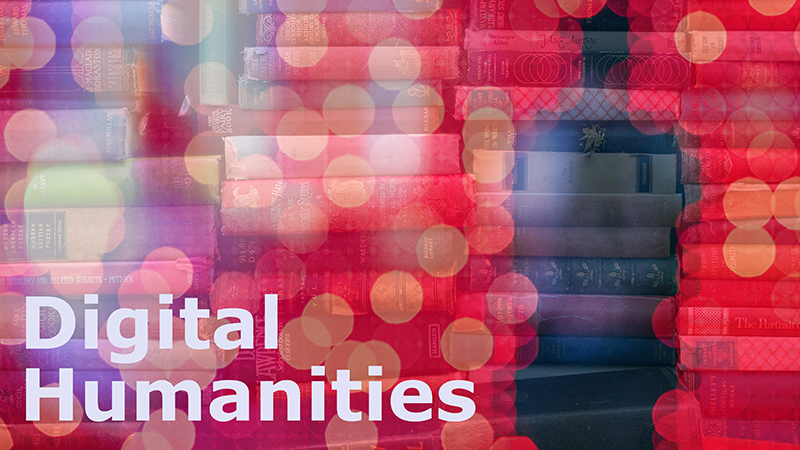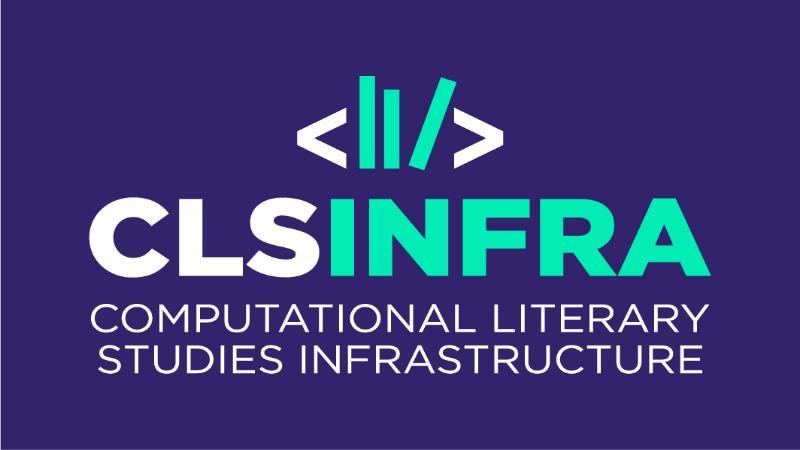Computational Literary Studies UK Training School
14-16 May, 2024

The Digital Humanities Research Group at the University of Wolverhampton and the Horizon funded CLS INFRA project invite you to join the first on-site Computational Literary Studies Training School in the UK. Computational Literary Studies (CLS) uses innovative methods and tools that offer different kinds of analyses by investigating large corpora. Scholars use text analysis software and programming languages to analyse hundreds of texts, which can be used to track character knowledge; illuminate dramatic development of plays; and help reveal the author identity of previously anonymous texts.
This Training School offers the opportunity to acquaint yourself with this field and develop your digital skills via hand-on training sessions by some of the key scholars in the field. The Training School is intended for those with a keen interest in boosting their skills. You do not need to know Python programming but openness towards using new technologies for research is a must.

Trainers include:
- Dr Lamyk Bekius (University of Antwerp, Belgium) – Track Changes: using keystroke logging for literary writing
- Floor Buschenhenke (Huygens, Netherlands) – Track Changes: using keystroke logging for literary writing
- Professor Karina van Dalen-Oskam (Huygens, Netherlands)
- Professor Maciej Eder (Director of the Institute of Polish Language at the Polish Academy of Sciences, PI on CLS INFRA)
- Prof Michaela Mahlberg Centre for Corpus Research, University of Birmingham) on the CLiC Dickens project
- Professor Bas Groes (English Literature, Wolverhampton, UK)
- Dr Artjom Šelas (Institute of Polish Language, Poland)
- Dr Martin Wynne (Senior Researcher Corpus Linguistics and National Coordinator Clarin UK, Oxford University, UK)
Schedule
Day 1
14 May Introduction to Computational Literary Studies
10:00-11:00 Thinking Computationally – Maciej Eder and Karina van Dalen-Oskam
11:00-11:30 Coffee/tea
11:30-13:00 Using Calibre to clean texts & create corpora – Groes (Wolverhampton, UK)
13:00-14:00 Lunch
14:00-15:30 Introduction to AntConc and Group Work – Martin Wynne
15:30-16:00 Coffee/tea
16:00-17:00 Case Study: Novel Perceptions:
19:30 Dinner: Made in Thai
Day 2
15 May Stylometry: An Introduction
10:00-11:00 Introduction to Stylometry (Karina van Dalen-Oskam, Huygens, Netherlands)
11:00-11:30 Coffee/tea
11:30-13:00 Basic Stylometry Workshop (Dalen-Oskam & Groes)
13:00-14:00 Lunch
14:00-17:00 Advanced Stylometry Group Work - Artjoms Šelas
17:00 Coffee/tea
19:30 Dinner: Pizzeria
Day 3
16 May Hands-on Sessions
10:00-12:30 Floor Buschenhenke and Lamyk Bekius on keystroke-logging and R and Case Study: Floor Buschenhenke (Huygens, Netherlands)
12:30- 13:30 Lunch
14:00-15:00 Case Study (1): Michaela Mahlberg (Centre for Corpus Research, University of Birmingham) on the CLiC Dickens project
15:30-17:00 Closing Group Reflection and Future Prospects Discussion
17:00-18:00 Drinks reception
The Training School is organized by the Digital Humanities Research Group at the University of Wolverhampton and the Horizon CLS INFRA project. Wolverhampton’s Digital Humanities Research Group is the home of staff and students who explore how computing and digital technologies offer new ways of understanding textual phenomena in the broadest sense. We are interested in investigating how new tools and methodologies yield a broad range of opportunities for reimagining literary studies. We deploy innovative ways of thinking about our world to tackle some of the key challenges facing society today, including threats to health and wellbeing, the rise of Artificial Intelligence and biases (including the unrecognised problem of digital inequality). We believe in the value of the critical-creative dialogue between pioneers of digital technology and the (literary) arts, humanities and social sciences to help us navigate potential human futures.
Computational Literary Studies Infrastructure (CLS INFRA) is a four-year partnership to build a shared resource of high-quality data, tools and knowledge to aid new approaches to studying literature in the digital age. The digital age offers challenges and opportunities for completing research on Europe’s multilingual and interconnected literary heritage. At present, the landscape of literary data, methods, and tools is diverse and fragmented. Even though many resources are currently available in digital libraries, a lack of standardisation hinders their access and reuse. The European Commission-funded CLS INFRA project will help to build the shared and sustainable infrastructure needed to undertake literary studies in the digital age. The project will align these diverse resources with each other, with the tools needed to interrogate them, and with a widened base of users. The resulting improvements will benefit researchers by bridging gaps between greater and lesser-resourced communities in computational literary studies and beyond, ultimately offering opportunities to create new research and insight into our shared and varied European cultural heritage.
Enquiries for a place: please write to Sebastian Groes at s.groes@wlv.ac.uk and put “CLSUK Training School” in the Subject line. Please send a 150-word statement about why you are interested in the Training School.


/prod01/wlvacuk/media/departments/digital-content-and-communications/images-18-19/iStock-163641275.jpg)
/prod01/wlvacuk/media/departments/digital-content-and-communications/images-2024/250630-SciFest-1-group-photo-resized-800x450.png)
/prod01/wlvacuk/media/departments/digital-content-and-communications/images-18-19/210818-Iza-and-Mattia-Resized.jpg)
/prod01/wlvacuk/media/departments/digital-content-and-communications/images/Maria-Serria-(teaser-image).jpg)
/prod01/wlvacuk/media/departments/digital-content-and-communications/images-2024/241014-Cyber4ME-Project-Resized.jpg)
/prod01/wlvacuk/media/departments/digital-content-and-communications/images-18-19/210705-bric_LAND_ATTIC_v2_resized.jpg)